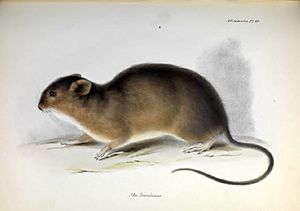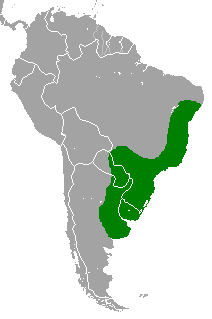Brazilian marsh rat facts for kids
Quick facts for kids Brazilian marsh rat |
|
|---|---|
 |
|
| Conservation status | |
| Scientific classification |
|
| Kingdom: | Animalia |
| Phylum: | Chordata |
| Class: | Mammalia |
| Order: | Rodentia |
| Family: | Cricetidae |
| Genus: | Holochilus |
| Species: |
H. brasiliensis
|
| Binomial name | |
| Holochilus brasiliensis (Desmarest, 1819)
|
|
 |
|
| Holochilus brasiliensis range map | |
| Script error: The function "autoWithCaption" does not exist. | |
Script error: No such module "Check for conflicting parameters".
The Brazilian marsh rat (scientific name: Holochilus brasiliensis) is a cool rodent that loves water! It's also known as the web-footed marsh rat because it's super good at swimming. This animal lives in parts of South America, especially in countries like Argentina, Brazil, and Uruguay.
Contents
Meet the Brazilian Marsh Rat
This marsh rat is a medium-sized rodent. Its body, from head to tail, can be about 16.7 to 21.1 centimeters long. Its tail is usually a bit longer than its body, measuring around 18.3 to 21.4 centimeters.
The Brazilian marsh rat has thick, soft fur. Its back is a warm cinnamon color, and its sides are a brighter orange. Its belly is a lighter orange, but its throat and chest are white. It also has some white fur near its legs.
Where Do They Live?
The Brazilian marsh rat is a semi-aquatic animal. This means it spends time both on land and in water. You can find it in eastern and southern Brazil, Uruguay, eastern Paraguay, and northeastern Argentina.
It usually lives in wet, grassy areas and woodlands. These places are often found near rivers in rainforests. You can find them both close to the coast and further inland.
Life in the Wild
The Brazilian marsh rat is a nocturnal animal. This means it is most active at night. It moves easily both on land and in the water.
Even though it's good at moving around, it's not often caught in traps. However, it is a common meal for animals like barn owls and other meat-eating mammals.
These rats eat soft plant shoots. They usually have their babies after it rains, in spring and summer. A mother marsh rat can have between three and six young at a time. Sometimes, these rats can become a problem for farmers. They might eat crops like sugar cane and rice.
Is It Endangered?
The International Union for Conservation of Nature (IUCN) has looked at the Brazilian marsh rat. They have decided it is a "least concern" species. This is good news!
It means the animal is not currently in danger of disappearing. It lives in many different places and can adapt to changes in its habitat. Also, it lives in several protected areas, and there are many of them, so their population seems stable.
See also
 In Spanish: Rata nutria para niños
In Spanish: Rata nutria para niños
 | John T. Biggers |
 | Thomas Blackshear |
 | Mark Bradford |
 | Beverly Buchanan |


